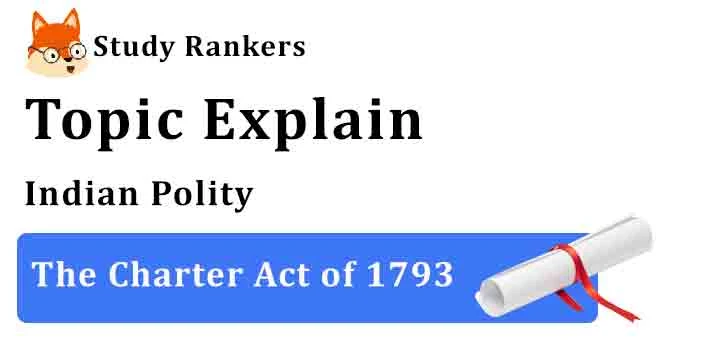Features and Objectives of The Charter Act of 1793 - Indian Polity
You will get Features and Objectives of The Charter Act of 1793 that will help UPSC IAS, SSC, NET, States PCS and other competitive exams aspirants. You will understand the various concepts of the topic through which one can improve their efficiency and eventually scores higher in the exam. These UPSC Notes are well-structured and give you a logical perspective of topics.

Features, Objectives and Provisions of The Charter Act of 1793| UPSC IAS
The Charter of the Company required renewal every twenty years. The East India Company was granted monopoly for trade in the East for 20 years. The occasion was utilised by Parliament to institute a thorough investigation into the affairs of the Company both in India and England, and to alter the conditions on which permission to trade was to continue. The Act of 1793 was passed without any serious opposition because the attention of Parliament was almost monopolised by the war with France and also because the finances of the Company were in a tolerably satisfactory condition. The Charter Act of 1793 is very long act. It introduced no important alterations in the system of government but it was a measure of consolidation.
Provisions or Features of Amendment Act of 1786
• It renewed the trade monopoly of the Company for another period of twenty years. Also, it changed the constitution of the Board of Control as regards number and qualifications of members and provided for the payment of their salaries and the expenses of the staff of the Board out of Indian revenues.
• The members of Council of Governor-General or Governor were essentially to be residents of India for the period of twelve years as Company’s servants at the time of their appointment.
• It extended the overriding power given to Lord Cornwallis over his council, to all future Governor-Generals and Governors of Presidencies. This power had, however, not to extend to judicial matters, taxation, etc.
• It gave the Governor-General more powers and control over the governments of the subordinate Presidencies of Bombay and Madras.
• Receiving of gifts and presents by the Company's servants was strictly prohibited again.
• The Governor-General-in-Council was empowered to appoint Justices of Peace in
any Presidency.
• The Act authorised the Local Governments to appoint scavengers for the Presidency town and to levy a sanitation tax to meet the cost.
• The act authorised local governments to grant licenses for the sale of liquor.
• The Act provided for an annual statement about the affairs of the Company in both England and India to be placed before Parliament.
The Act also reiterated the policy of non-intervention as outlined in the Pitt’s India Act of 1784.






0 Comments
Comment Related Post
Emoji